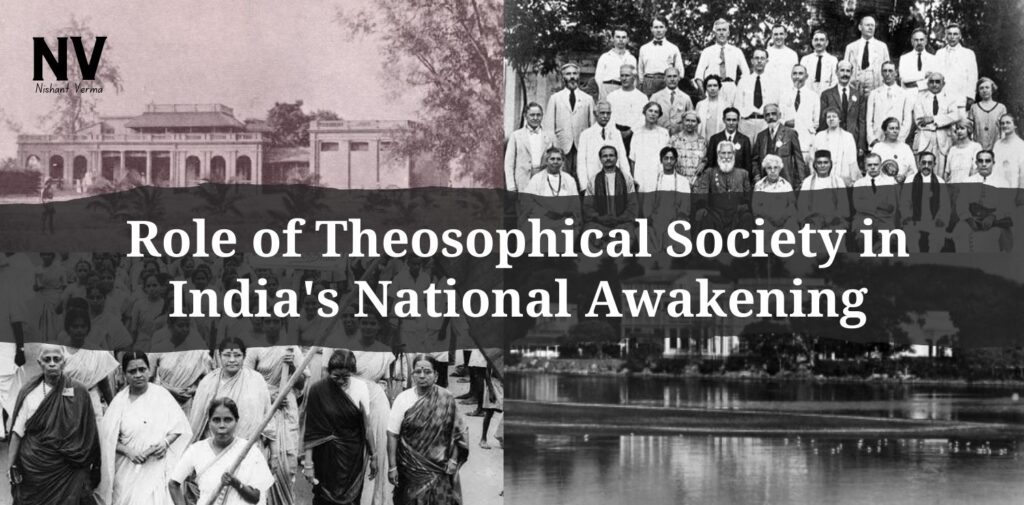In the late 19th and early 20th centuries, India was under British rule, and many Indians were unhappy with the foreign control over their land. But during this time, a group called the Theosophical Society played an important role in bringing about India’s National Awakening—which is the term used for the growth of Indian nationalism and the desire for independence. This article will explain Role of Theosophical Society & How they helped in awakening the people of India to their cultural heritage and in inspiring them to fight for their rights.
What Was the Theosophical Society?
Before understanding how the Theosophical Society helped India, let’s first know what it was. The Theosophical Society was an organization founded in 1875 by two people, Helena Petrovna Blavatsky from Russia and Henry Steel Olcott from the United States. It was created to explore and promote the study of ancient wisdom, spiritual knowledge, and the unity of all religions. The main idea of the society was to bring together people from all parts of the world to learn about the deep truths of life, nature, and the universe.
Although the Theosophical Society started in the West, it became very popular in India, especially among the educated people.
The Role of Theosophical Society in India
The Theosophical Society’s role in India’s national awakening is unique and very significant. It didn’t focus directly on fighting British rule through political movements, but it did something very important: it helped to awaken a sense of pride in India’s cultural and spiritual heritage. This was crucial in the fight for independence. Let’s explore how.
Reviving India’s Ancient Culture and Spirituality
India has a rich history of spirituality and wisdom, going back thousands of years. The Theosophical Society helped many Indians to rediscover their own ancient traditions, religious practices, and philosophy.
At that time, India was under British rule, and many people started thinking that their culture was backward compared to the West. British people often looked down on Indian traditions and made Indians feel that their own culture wasn’t valuable. The Theosophical Society, however, encouraged Indians to look back at their Vedic and Hindu traditions with pride. The society’s leaders promoted ideas from the Upanishads, Bhagavad Gita, and other sacred texts that emphasized the unity of all life and the importance of inner spiritual growth.
By connecting with this deep spiritual wisdom, many Indians began to feel proud of their heritage, which in turn helped them to realize that they didn’t need to follow everything the British said. This feeling of pride in their culture was a crucial part of the Indian National Awakening.
Inspiring Nationalism through Unity of Religions
One of the most important teachings of the Theosophical Society was the idea of the unity of all religions. The society believed that all religions ultimately taught the same truth, though in different ways. This was an important message in a country like India, which was made up of many different religions and communities.
The leaders of the Theosophical Society worked to bring together people from different religions—Hindus, Muslims, Christians, Sikhs, and others—and showed them that they could unite in the common cause of national freedom. The idea was to focus on the shared values of love, peace, and justice found in all religions, rather than on the differences between them.
This idea helped to create a sense of unity among the people of India, which was very important for the success of the independence movement. The Theosophical Society also emphasized the importance of social reforms like ending untouchability, promoting women’s education, and improving the lives of the poor, which were all key parts of the larger nationalist movement.
Creating a National Awakening Among the Youth
The Theosophical Society was not just for the older generation. It actively worked to inspire and educate young Indians, especially students. In 1882, the society established its first school in Madras (now Chennai), called the Central Hindu College, which became an important center of learning for young people.
The students who studied there were taught not just modern subjects like science and English, but also about India’s ancient wisdom and culture. This helped to shape a new generation of Indians who were both proud of their heritage and ready to fight for India’s rights. Many of these students later became active in the Indian National Congress, the political party that led the movement for independence.
The Theosophical Society also helped in the formation of various other educational institutions that played a major role in India’s cultural and political awakening.
Promoting India on the Global Stage
The Theosophical Society played an important role in promoting India’s image abroad. Leaders of the society traveled around the world and spoke about India’s ancient traditions, its rich culture, and its spiritual wisdom. This helped to change the perception of India from being a “backward” country under British rule to a land with a rich history of spiritual and cultural greatness.
By doing so, This Society helped to attract the attention of international leaders and thinkers who began to see India as a nation with much potential. This shift in perception helped build support for India’s cause of independence from British rule.
Influencing Important National Leaders
Many important leaders of the Indian independence movement were deeply influenced by the Theosophical Society and its teachings. For example:
- Swami Vivekananda, one of India’s most famous spiritual leaders, was inspired by this Society. He shared its ideas about the greatness of India’s spiritual and cultural heritage with the world at the World Parliament of Religions in Chicago in 1893. His famous speech there made the world sit up and take notice of India’s rich history.
- Lala Lajpat Rai, another important freedom fighter, was also connected with the Theosophical Society. He believed that India needed to combine its ancient traditions with modern ideas to build a strong nation.
These leaders, and many others, carried forward the message of the Theosophical Society in their own way, helping to spread the ideas of self-respect, unity, and national pride among the Indian people.
Theosophical Society’s Influence on Indian Politics
Although the Theosophical Society itself did not directly take part in politics, its ideas had a significant impact on India’s political leaders. The Indian National Congress, which was the main political party leading the struggle for independence, started to use some of the ideas in its campaigns.
The idea of cultural nationalism promoted by the Theosophical Society became a key part of the Indian independence movement. Leaders like Bal Gangadhar Tilak and Bipin Chandra Pal used these ideas to inspire people to unite and fight for India’s freedom. They also helped to create a sense of unity among Indians, which was important in the struggle against British rule.
Conclusion: A New Era for India
The Theosophical Society played an important, though often overlooked, role in India’s national awakening. By helping to revive India’s rich cultural and spiritual heritage, inspiring people to unite across religious boundaries, and educating the younger generation, it laid the foundation for India’s struggle for independence.
Its message of unity, pride in one’s culture, and respect for all religions resonated with many Indians, and its ideas helped shape the thinking of some of India’s greatest leaders. Today, the legacy of the Theosophical Society is still remembered as an important part of India’s journey toward freedom.
The Theosophical Society didn’t just help India get its independence—it helped awaken the soul of the nation, inspiring Indians to believe in their own strength, their culture, and their future.




